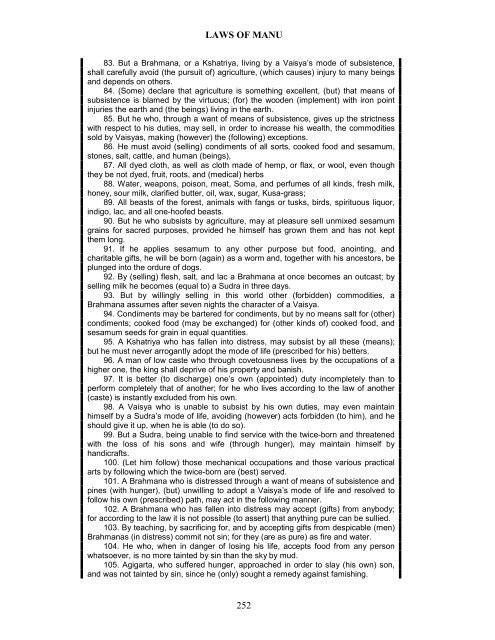Create successful ePaper yourself
Turn your PDF publications into a flip-book with our unique Google optimized e-Paper software.
LAWS OF MANU<br />
83. But a Brahmana, or a Kshatriya, living by a Vaisya’s mode of subsistence,<br />
shall carefully avoid (the pursuit of) agriculture, (which causes) injury to many beings<br />
and depends on others.<br />
84. (Some) declare that agriculture is something excellent, (but) that means of<br />
subsistence is blamed by the virtuous; (for) the wooden (implement) with iron point<br />
injuries the earth and (the beings) living in the earth.<br />
85. But he who, through a want of means of subsistence, gives up the strictness<br />
with respect to his duties, may sell, in order to increase his wealth, the commodities<br />
sold by Vaisyas, making (however) the (following) exceptions.<br />
86. He must avoid (selling) condiments of all sorts, cooked food and sesamum,<br />
stones, salt, cattle, and human (beings),<br />
87. All dyed cloth, as well as cloth made of hemp, or flax, or wool, even though<br />
they be not dyed, fruit, roots, and (medical) herbs<br />
88. Water, weapons, poison, meat, Soma, and perfumes of all kinds, fresh milk,<br />
honey, sour milk, clarified butter, oil, wax, sugar, Kusa-grass;<br />
89. All beasts of the forest, animals with fangs or tusks, birds, spirituous liquor,<br />
indigo, lac, and all one-hoofed beasts.<br />
90. But he who subsists by agriculture, may at pleasure sell unmixed sesamum<br />
grains for sacred purposes, provided he himself has grown them and has not kept<br />
them long.<br />
91. If he applies sesamum to any other purpose but food, anointing, and<br />
charitable gifts, he will be born (again) as a worm and, together with his ancestors, be<br />
plunged into the ordure of dogs.<br />
92. By (selling) flesh, salt, and lac a Brahmana at once becomes an outcast; by<br />
selling milk he becomes (equal to) a Sudra in three days.<br />
93. But by willingly selling in this world other (forbidden) commodities, a<br />
Brahmana assumes after seven nights the character of a Vaisya.<br />
94. Condiments may be bartered for condiments, but by no means salt for (other)<br />
condiments; cooked food (may be exchanged) for (other kinds of) cooked food, and<br />
sesamum seeds for grain in equal quantities.<br />
95. A Kshatriya who has fallen into distress, may subsist by all these (means);<br />
but he must never arrogantly adopt the mode of life (prescribed for his) betters.<br />
96. A man of low caste who through covetousness lives by the occupations of a<br />
higher one, the king shall deprive of his property and banish.<br />
97. It is better (to discharge) one’s own (appointed) duty incompletely than to<br />
perform completely that of another; for he who lives according to the law of another<br />
(caste) is instantly excluded from his own.<br />
98. A Vaisya who is unable to subsist by his own duties, may even maintain<br />
himself by a Sudra’s mode of life, avoiding (however) acts forbidden (to him), and he<br />
should give it up, when he is able (to do so).<br />
99. But a Sudra, being unable to find service with the twice-born and threatened<br />
with the loss of his sons and wife (through hunger), may maintain himself by<br />
handicrafts.<br />
100. (Let him follow) those mechanical occupations and those various practical<br />
arts by following which the twice-born are (best) served.<br />
101. A Brahmana who is distressed through a want of means of subsistence and<br />
pines (with hunger), (but) unwilling to adopt a Vaisya’s mode of life and resolved to<br />
follow his own (prescribed) path, may act in the following manner.<br />
102. A Brahmana who has fallen into distress may accept (gifts) from anybody;<br />
for according to the law it is not possible (to assert) that anything pure can be sullied.<br />
103. By teaching, by sacrificing for, and by accepting gifts from despicable (men)<br />
Brahmanas (in distress) commit not sin; for they (are as pure) as fire and water.<br />
104. He who, when in danger of losing his life, accepts food from any person<br />
whatsoever, is no more tainted by sin than the sky by mud.<br />
105. Agigarta, who suffered hunger, approached in order to slay (his own) son,<br />
and was not tainted by sin, since he (only) sought a remedy against famishing.<br />
252


















